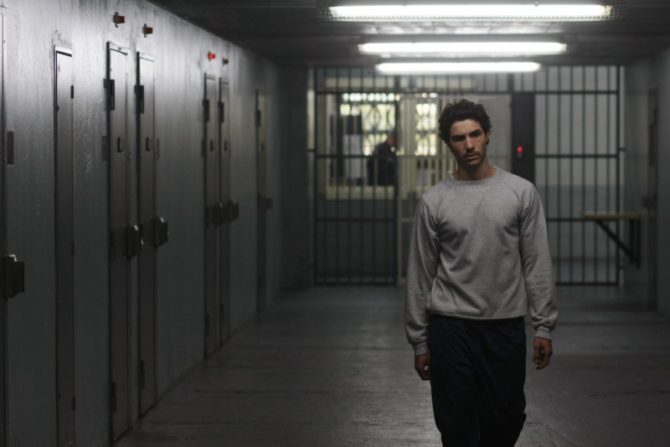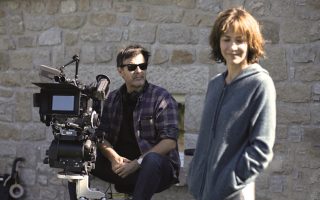Jacques Audiard’s Un prophète Goes for the Gold

Update: Audiard’s Un prophète reigned at the French Césars on Saturday, February 27.
You can count his movies on the fingers of one hand—only five in a 15-year career. But Jacques Audiard has already become one of the greatest French directors of all time, alongside such greats as Henri-Georges Clouzot (Diabolique), Jean-Pierre Melville (The Godson), and Jacques Becker (The Night Watch). Lauded by audiences and critics alike, his latest film, A Prophet—the Grand Prix du Jury winner at Cannes last year—offers a realistic, violent, edge-of-the-seat experience. It’s the crowning achievement to date for this meticulous, discreet filmmaker, now poised to hit it big in the United States with the film’s February 26 release.
The son of popular screenwriter and director Michel Audiard (famed for his sharp dialogue and responsible for, among others, the hilarious Monsieur Gangster and the somber Under Suspicion), the young Audiard first wanted to become a teacher. But he soon abandoned his literary studies to join the cinematic milieu, inspired by the likes of Werner Herzog and Rainer Werner Fassbinder. “Audiard has grown up with this double heritage, his father’s cinéma populaire on one hand, the Nouvelle Vague on the other,” explains Léo Haddad, movie critic for the French magazine Technikart. “The two traditions may seem at odds, but Audiard has managed to wrest from the contradiction something truly unique.”
After a few years of writing adaptations for small theatrical productions, in the early 1980s this natural-born writer began a prolific period writing screenplays, including Claude Miller’s Deadly Circuit and dialogue for Michel Blanc’s Dead Tired. After some success making short films, Audiard directed his first full-length feature, See How They Fall, in 1994.
Starring the remarkable Jean-Louis Trintignant and then-novice Mathieu Kassovitz, this intriguing road movie—awarded three Césars, including Best First Film—laid the framework for Audiard’s universe: desperate male characters adrift in a murky, faux-thriller atmosphere but a truly dark world.
The two lead actors starred again in Audiard’s next movie, A Self-Made Hero (1996), with Kassovitz playing the young Albert Dehousse, an impostor who pretends to be a hero of the French Resistance after World War II. Elegant and witty, the movie not only won the award for Best Screenplay at Cannes but also had a wider social impact, prompting national debate on the myths of the Resistance.
Five years later—in a tremendous year for French cinema that included Amélie, The Pianist and Officer’s Ward—Audiard’s third film, Read My Lips, walked off with three Césars, including Best Screenplay and Best Actress for the impressive Emmanuelle Devos. Audiard’s brilliant casting shines once again in this peculiar love story about two outsiders, a hoodlum (Vincent Cassel) and a deaf secretary (Devos), plotting to con a group of gangsters. Audiences eagerly awaited his next effort, a loose remake of James Toback’s Fingers (1978). With rising star Romain Duris in the lead role, De Battre Mon Coeur S’est Arrêté—The Beat That My Heart Skipped—tells the story of Tom, a young real estate broker who tires of his father’s shady deals and dreams of becoming a pianist like his mother. Critically acclaimed, the movie was a huge winner in 2006, with eight César awards including Best Picture and Best Director.
“Oddly, The Beat That My Heart Skipped is far from his best movie,” in Haddad’s assessment. “But Audiard understood that he had reached his limit with that approach. The film speaks to his own doubts, his own hesitation in crossing the line between film d’auteur and film de genre. With A Prophet, he decided to tear down those partitions and prove them obsolete.”
His fifth movie is one of those outstanding cinematic bildungsromans you’ll never forget. But make no mistake: A Prophet is not a religious story. “I wanted a French equivalent for Bob Dylan’s song Gotta Serve Somebody,” explained Audiard while in Cannes. “I liked the fatalism and the moral angle in that title, but I couldn’t come up with a proper translation. So it became Un Prophète, referring to a new man.” The man is Malik El Djebena, a scrawny, illiterate young thug who has been sentenced to six years in jail. At the mercy of the other inmates, struggling for survival, the young Arab must seek protection from the Corsican gang that rules the prison populace. In exchange, he becomes their house slave and is forced to kill Reyeb, a potential witness against mob boss César Luciani. But as the years pass, Malik gains confidence and challenges the prisoners’ power structure, adroitly playing groups off against each other to build his own empire.
A harsh immersion in a gangster-driven underworld, with a few surrealistic touches, the film touched off a polemic among French politicians, who condemned the “message” it could transmit in France’s blighted suburbs. But Audiard quickly dismissed their critiques, declaring on TV, “The only message is cinema.” Haddad observes: “A Prophet might be a political movie, but only because it is so firmly rooted in reality. Audiard puts Corsicans and Arabs in his film, but he doesn’t brood about how he should present them or what plot function they should serve. That’s why they seem so real, and hence so striking and so poignant. We haven’t seen a French movie in 10 years that is so true to life, where the actors talk like real people.”
In fact, with this film Audiard introduces a brand-new generation of actors, mostly unknown, who offer a breath of fresh air for French cinema, which is often entrenched with its familiar figures. Among the new faces, special kudos go to Tahar Rahim, who brilliantly conveys the transformation of Malik, imbuing his character with depth and power throughout his trajectory from petty mugger to esteemed leader. It’s the story of an improbable education, a tough road to maturity. For Jacques Audiard, it is also a milestone: The French Ministry of Culture has chosen the film as its entry for Best Foreign Film at the Academy Awards. Can A Prophet win an Oscar?
Originally published in the February 2010 issue of France Today.
Share to: Facebook Twitter LinkedIn Email
Leave a reply
Your email address will not be published. Required fields are marked *



